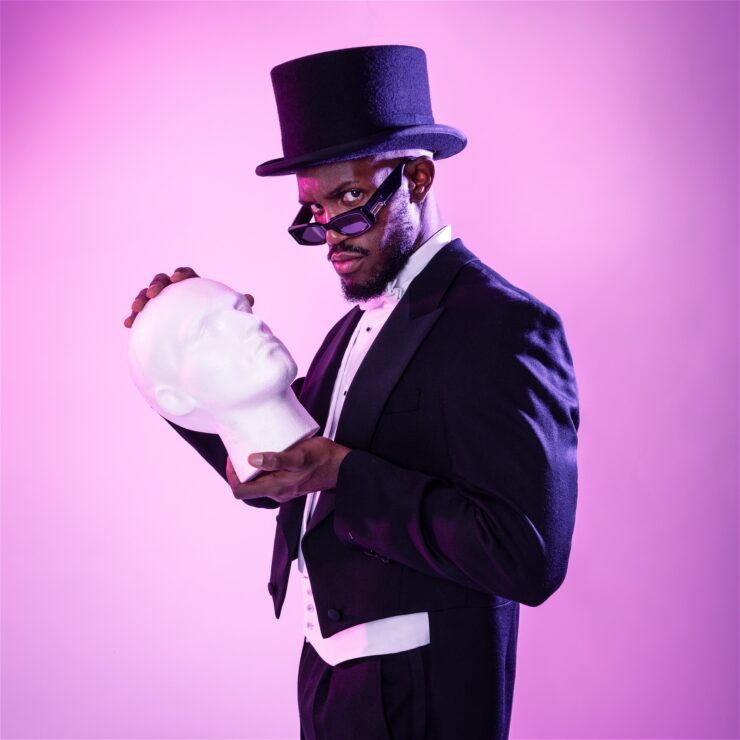Disarmingly honest and pointedly spirited, Five Years With The White Man is an odyssey into the life of Edwardian-era writer Augustus (ABC) Merriman-Labor and the tragic circumstances which take the lives of young Gay Black Men too soon. Far from campaigning on one issue, this piece expresses the vibrant and forgotten life of Merriman-Labor in his attempts to create a subversive ethnographic work about the people of London for those in his home country of Sierra Leone, then still a colony of the British Empire. In striking and demanding contrast, the actor playing ABC soon bursts from his role to reveal a heart-wrenching secret about the show’s origins. It’s a move that carries on Merriman-Labor’s tradition of destabilising a genre through the lived experience of a young black man – notably living in the same city some centuries ahead. The show will judder some with its flux and phasing, but for those with the patience to dig deeper into the show’s intimate themes, the gleaming reward is there to be found.
ABC sets off from Freetown to seek fancy and fortune as a writer, with enough cash from his father to put him through law school and make a name for himself on the streets of London. He soon finds that no honest sympathy awaits a young gay Black man arriving in Bloomsbury at the turn of the 20th century, and to fit in he is going to have to grift, grovel and gamble through the societal turnstiles that lay in front of him. From pretending to be an African Prince to secure lodgings from the socially-perverted White Upper Middle Class of North London, to using the name of his influential Father in business dealings at the docks, Merriman-Labor is willing to do anything to get his name out there. When an old male friend from Freetown arrives and their bodies intertwine, he sets himself on a course that promises no return to the world he left behind.
The actor playing ABC soon seems to drop the curtain, and declares himself to be a man named Dumebi Okafor. He bursts through the Fourth Wall in an early scene to answer an important email awaiting him on his phone at the tech desk, as a blaring iPhone alarm finds it’s way through the centuries into a ship in the late 1800s. What emerges from this parallel narrative, which smartly enchants you with its’ realism and abruptness, is a story of queer euphoria against the backdrop of growing up as a Black man in 2000s London. The story distantly mirrors elements of Merriman-Labor’s own, transplanting our expectations of the past into the present, and as we learn about the tragic origins of the show and its’ recently passed playwright, we uncover a story of cathartic bliss and revolutionary historiography. I’m still not sure how closely the Fourth Wall-breaking sections trace the truth, and to be honest with you I don’t want to know. There is some beautiful, tragicomic magic in the way the aura of reality surrounding the piece descends on you.
We know for certain that the actor’s real name is Joseph Akubeze, and his performance is a triumph. He recklessly leaps around the stage, climbing on chairs and desks, with about as much regard for his own personal safety as a lemming, determined above all to energise and entertain. A performance-polymath, Akubeze effortlessly blends his larger than life stage personalities with live looping of sound effects, creating a market in Sierra Leone, or the Caledonian Sleeper, simply with his mouth and a microphone. On top of that, he performs the roles of several characters simply through the manipulation of a desk lamp, handling it as if it were another actor on the stage and with delicate care. The whole hour with Akubeze at the centre is so entrancing, so dearly consuming and textually rich. It’s a delight.
The stage design too offers a playground for Akubeze, with blackboards doubling as a judge’s bench, and objects which initially might have seemed like clutter used in the sound looping process to engrossingly good effect. The interjections and conversations with the technician are great, and Sam Rayner’s tight and controlled direction plays off the whole magic-realism feel of the piece. Unleash the Llama continue their reputation of subversion, personality and a spirited divulging into long-obscured history.
This show may prove too alienating for some in the way it handles the whole “play goes wrong” shtick, and could be divisive to that effect. The narrative subversion continually add layers to the piece, and it may be a little bit of a plotline sensory overload for some. For me, however, digging the deepest depths reveals the greatest reward. Rich, engrossing and characteristically spirited – you will leave with a broken heart and an enriched mind.
Recommended Drink: Five Years With The White Man is a Shirley Temple – sobering but refreshing, classic but revived.
Catch Five Years With The White Man until Sunday 5th March at 19:50, 19:10 and 16:10 (date dependent). Tickets are available through the VAULT Festival Box Office.









